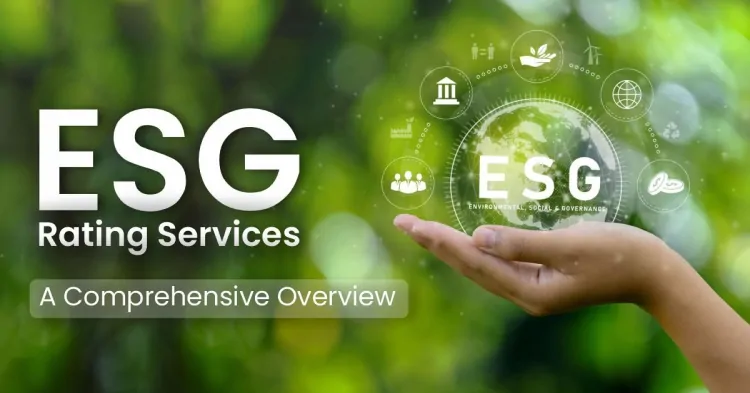ESG Ratings Drive Corporate Responsibility and Sustainable Growth
ESG ratings, in particular, have become crucial tools for investors, regulators

In recent years, Environmental, Social, and Governance (ESG) factors have evolved from being a niche consideration to a fundamental part of global business and investment strategies. ESG ratings, in particular, have become crucial tools for investors, regulators, and stakeholders to assess a company’s commitment to sustainability, ethical behaviour, and responsible business practices. These ratings assess a company's performance in three key areas: environmental impact, social responsibility, and governance practices.
What Are ESG Ratings?
ESG ratings provide a thorough evaluation of a company’s performance across three primary pillars:
Environmental: This dimension assesses how effectively a company manages its environmental footprint. Key factors include carbon emissions, energy efficiency, water usage, waste management, and biodiversity conservation efforts. Companies that prioritize sustainability and actively reduce their environmental impact typically score higher in this category.
Social: The social aspect evaluates how a company interacts with its employees, customers, and the community. Important factors include employee relations, diversity and inclusion, customer privacy, product safety, and community engagement. Companies that foster social equity, inclusivity, and ethical treatment of stakeholders tend to score better in this area.
Governance: Governance focuses on how a company is structured and managed. This includes corporate governance practices, executive compensation, board diversity, transparency, and ethical business conduct. Companies with strong governance frameworks and a commitment to ethical decision-making typically perform well in this category.
The Importance of ESG Ratings
Informed Decision-Making for Investors: ESG ratings provide valuable insights for investors assessing the long-term sustainability and viability of a company. Companies with strong ESG performance are better positioned to manage risks such as regulatory changes, environmental impacts, and reputational issues. ESG ratings help investors identify companies that align with their values while also minimizing the risks of poor ESG practices.
Risk Mitigation: ESG factors have a significant impact on a company’s financial and operational stability. Poor ESG performance can result in reputational damage, legal liabilities, and regulatory penalties, all of which can harm a company’s bottom line. ESG ratings help businesses identify and mitigate these risks early, allowing them to take preventive measures before any potential financial losses.
Regulatory Compliance: With governments worldwide imposing stricter ESG regulations, businesses must align with these evolving standards. ESG ratings assist companies in meeting legal requirements related to environmental protection, social responsibility, and governance practices. A strong ESG rating can build trust with regulators, customers, and investors, ensuring long-term credibility and success.
Enhancing Corporate Reputation: A strong ESG rating signals a company’s commitment to ethical practices and sustainability. Companies with positive ESG profiles attract customers, investors, and business partners who prioritize responsible business practices. A good ESG rating not only strengthens a company’s reputation but also provides a competitive advantage in the marketplace.
Driving Positive Change: ESG ratings encourage businesses to adopt more sustainable practices, improve social responsibility efforts, and strengthen governance frameworks. By identifying areas for improvement, ESG ratings motivate companies to make meaningful changes that positively impact society, the environment, and their operations.
How ESG Rating Services Work
Data Collection: ESG rating agencies gather data from various sources, including company disclosures (such as sustainability reports), media coverage, regulatory filings, and direct engagement with companies. This data is essential for assessing how well a company performs in its environmental, social, and governance responsibilities.
Assessment Framework: ESG rating agencies use proprietary methodologies to evaluate companies. These methodologies focus on materiality (identifying ESG issues that are most relevant to a particular industry), weightage (assigning importance to different ESG factors), and benchmarking (comparing a company’s performance with industry peers).
Scoring and Rating: Companies are given scores based on their performance in each ESG pillar, resulting in an overall rating. Rating scales may include numeric scores (e.g., 0-100), letter grades (e.g., A to D), or percentile rankings. These ratings allow stakeholders to compare a company’s ESG performance with others in the same industry.
How Companies Can Improve Their ESG Ratings
Proactive Disclosure: Transparency is key. Companies should regularly disclose their ESG efforts, achievements, and challenges through sustainability reports and other public channels. Consistent, honest reporting enhances credibility and builds trust with investors and stakeholders.
Materiality Assessment: Companies should focus on the ESG factors most relevant to their industry and stakeholders. By aligning sustainability efforts with key issues, businesses ensure that their actions are impactful and meaningful.
Stakeholder Engagement: Effective communication with employees, customers, investors, and regulators is crucial for aligning ESG strategies with stakeholder expectations. Ongoing engagement helps foster a shared vision of sustainability and strengthens support for ESG initiatives.
Independent Audits: Third-party audits provide an objective assessment of a company’s ESG performance. These audits validate the accuracy of ESG disclosures, ensuring transparency and accountability in reporting.
Continuous Improvement: ESG is an ongoing process. Companies should regularly review and update their ESG strategies to address emerging challenges and evolving stakeholder expectations. By committing to continuous improvement, businesses can stay ahead of industry trends and maintain strong ESG performance.
Conclusion
ESG ratings have become an indispensable tool for businesses, investors, and regulators to evaluate corporate sustainability and ethical practices. These ratings influence investment decisions, regulatory compliance, and long-term growth strategies. For companies, achieving high ESG ratings is not just about improving scores but about fostering a culture of responsibility, sustainability, and ethical governance. For investors and stakeholders, ESG ratings provide a reliable framework for assessing a company’s long-term value and its societal and environmental impact.
About RESURGENT ESG Services Pvt. Ltd.
Resurgent ESG Services Pvt. Ltd., a subsidiary of Resurgent India Ltd., specializes in providing ESG rating services across various industries. Combining financial expertise with a focus on sustainability, Resurgent ESG delivers reliable, consistent ratings that help investors identify companies with strong ESG practices.
What's Your Reaction?














